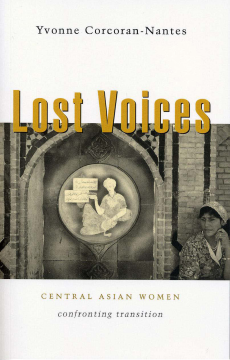
Additional Information
Book Details
Abstract
In 1991 the collapse of the Communist Party and the dissolution of the Soviet Union launched the republics of Uzbekistan, Kyrgyzstan and Kazakhstan into an unexpected self-declared independence and a precarious, uncertain future. Emerging from almost seventy-five years of Soviet tutelage all three republics embarked on a process of radical change. Central Asian women's lives have been profoundly affected during the huge upheavals of sovietization in the 1920s and democratisation in the 1990s, but their experiences have gone unresearched and undocumented. If Central Asia was generally considered to be the forgotten world of the Soviet Union, Central Asian women constitute the 'lost voices' of Central Asia.
Yvonne Corcoran-Nantes offers a timely analysis into the lives of Muslim women during the Soviet era, and considers the impact of the shift from Soviet communism to Western capitalist ideals and its impact on gender relations in the region. The uneasy synthesis between socialism and Islam under the Soviet regime offered many women considerable status and personal freedom in public life but these gains have been rapidly eroded in the process of 'democratization'. Opportunities for women have entered into serious decline in terms of employment, education and socio-political status. Unlike many commentators, she offers a convincing argument that the main threat to the socio-political status of women in Central Asia is not Islamic fundamentalism, but the imposition of free market principles and Western 'liberal democratic' ideals. Woven into the text is a also subtle and nuanced analysis of the ways in which Central Asian women negotiate feminism, whether ushered in by Soviet women during sovietization, or by western NGOs in the region today.
As a special consultant to UNESCAP, the author was one of the first researchers to undertake substantial research in the republics of Kazakhstan, Kyrgyzstan and Uzbekistan in the post-independence period and this book is based on her interviews with women from the region from all sections of Central Asian society.
Yvonne Corcoran-Nantes is a senior lecturer in the School of Political and International Studies and the Department of Women’s Studies at Flinders University, Australia. Her principal research interests and publications have been in the field of gender politics and development and focused on Latin America, Central Asia and Mongolia. She has acted as a consultant to the UN as well as international and national NGOs.
'The main strength of Lost Voices is the excellent account that it gives of the situation of women in Central Asia during the Soviet Period ... for anyone with an interest in, and some knowledge of, Central Asia this book constitutes an excellent introduction to, and analysis of, gender issues in Kazakstan, Kyrgyzstan, and Uzbekistan.'
Joanna Hoare, project manager - publishing, Oxfam GB
'Lost Voices takes an important step in opening up dialogue with women in what are perceived to be backward and repressive Central Asian societies ... Dr Corcoran-Nantes makes a valuable contribution to the wider understanding of the lives of Central Asian women.'
Asian Affairs
Table of Contents
| Section Title | Page | Action | Price |
|---|---|---|---|
| Cover | Cover | ||
| Contents | v | ||
| Acknowledgements | vii | ||
| Introduction | 1 | ||
| Notes | 5 | ||
| 1 | Seeing through Western eyes and the sound of Western voices | 7 | ||
| Debating the ‘woman question’ post-perestroika | 11 | ||
| Changing position: insiders and outsiders past and present | 17 | ||
| Central Asian women - the lost voices | 25 | ||
| Notes | 30 | ||
| 2 | Gender, Islam and nationalism: subterfuge and resistance in the Soviet era | 33 | ||
| The institutionalization of Soviet gender equality - the challenge to shariat and adat law | 39 | ||
| The ‘Offensive’: the imposition of Khudjum and the unveiling of women | 43 | ||
| Throwing down the gauntlet - the role of the Zhenotdel in female emancipation in Central Asia | 49 | ||
| Moving forward, looking back | 57 | ||
| Notes | 60 | ||
| 3 | The private and public face of economic emancipation: gender, work and education | 63 | ||
| Educating women: a flawed opportunity | 68 | ||
| The demise of the ‘surrogate proletariat’: women, work and de facto inequality | 77 | ||
| Facing the change: female unemployment, training and opportunity in the transition period | 99 | ||
| Notes | 105 | ||
| 4 | A healthy generation: women, environment and reproductive health | 109 | ||
| After the fallout: women and the environmental crisis | 113 | ||
| A right to choose?: women, reproduction and health | 119 | ||
| Towards a healthy generation? | 126 | ||
| Notes | 131 | ||
| 5 | Faith, community and fire: women, Islam and the family | 134 | ||
| Otines - women as guardians of the faith | 137 | ||
| Solidarity, tradition and belonging: women, family and community | 142 | ||
| Facing the backlash - tradition, marriage and the spectre of domestic violence | 148 | ||
| Notes | 157 | ||
| 6 | Climbing the political mountain - female empowerment and disempowerment in a post-Soviet era | 160 | ||
| Finding a way through - political representation in Soviet and post-Soviet politics | 164 | ||
| From insiders to outsiders - female representation in a post-Soviet era | 169 | ||
| Making the change: from government organizations to non-government organizations | 175 | ||
| Notes | 188 | ||
| Bibliography | 191 | ||
| Index | 202 |
